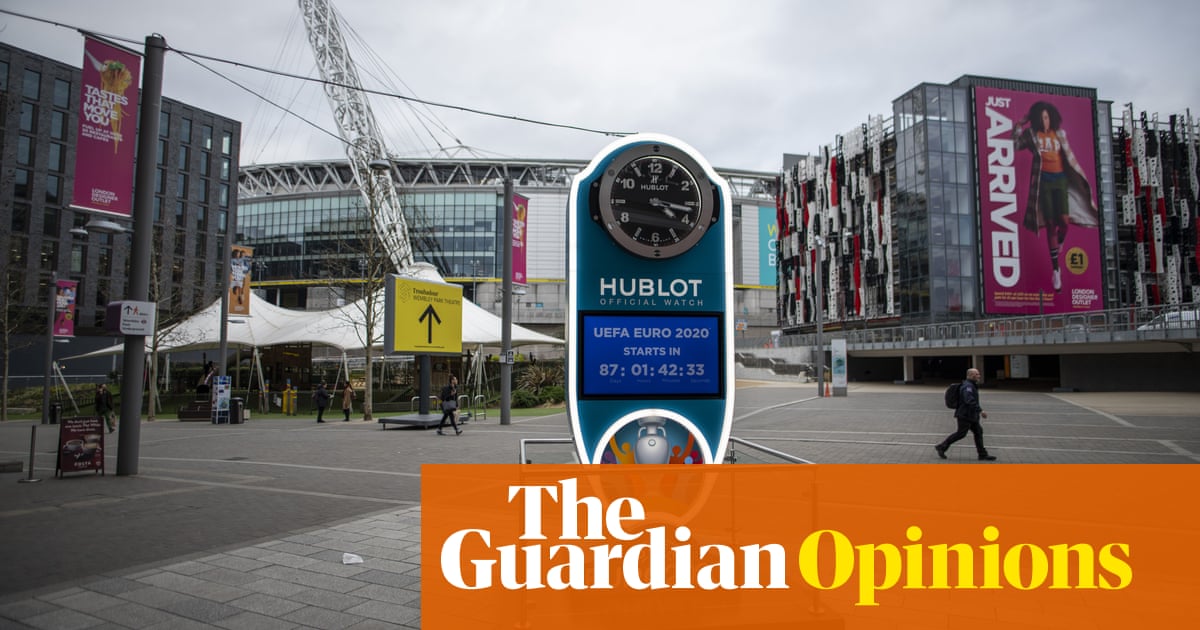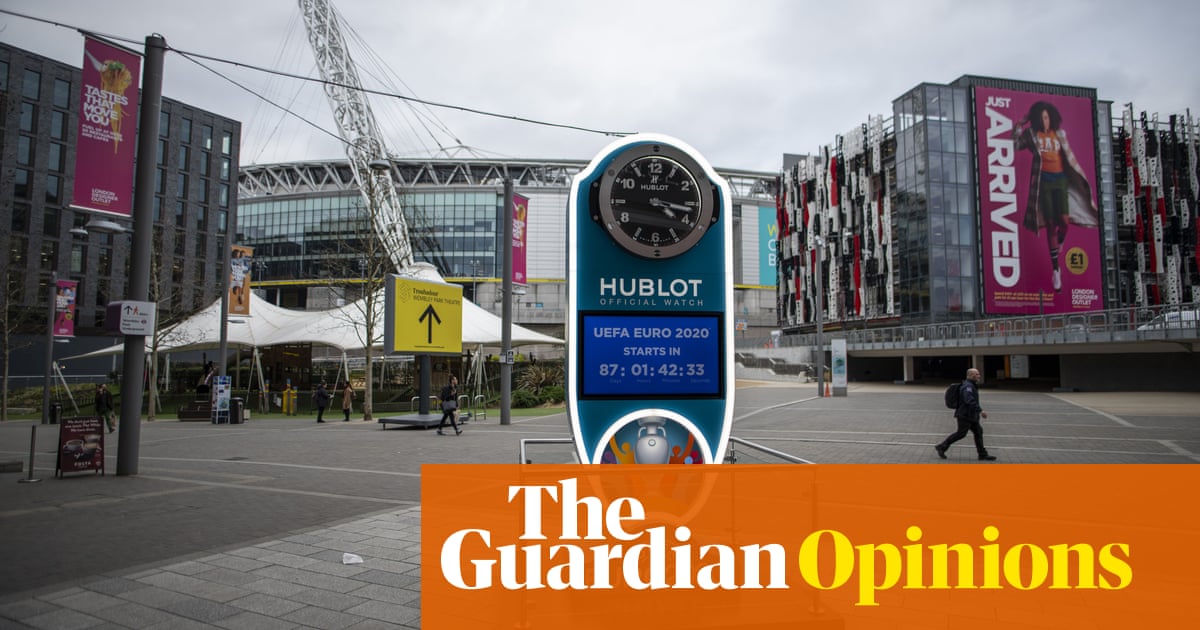Cursed Euro 2020 might just give us what we need next year | Barney Ronay
The 1950s idealism behind the European Championship has been replaced by a ludicrously distended tournament but celebration and collectivism could re-emerge at Euro 2021

The lamps are going out. They will be lit again across Europe 15 months from now if current timescales hold. Although what traumas the 12 host cities for Uefas Euros of Everywhere might have endured by then is open to uncomfortable speculation.
For now Romes piazzas are empty. Bucharest has declared a state of emergency. Madrid feels like a meteorite has fallen on us. As for the final venue, London, well, this place is coming like a ghost town.
The decision to postpone Euro 2020 was announced on Tuesday afternoon after a videolink conference of Uefas member associations. But it came as a surprise to nobody.
Such is the speed of the news cycle it is hard to recall such ostensibly huge sporting news that has felt like such an afterthought.
This time last week Liverpool were preparing to take on Atltico Madrid at Anfield and the established version of sporting reality seemed to be holding, just about. It took us a week to get from there to here. What paradigm shifts will the next five weeks hold? European football does at least have a revised, sensible-looking start date for this benighted, cumbersome sporting white elephant. Euro 2020 is now officially Euro 2021, destined to run from 11 June to 11 July with details and logistics to fall into step behind.
What to make of this? It has become a reflex action to quail and froth at every decision made by the executive in every sphere. In reality there is no good solution to any of this, just as the postponement of European footballs 2bn cash cow shrinks into insignificance alongside the wider effects of the current viral slowdown.
Like every other industry football is faced with guesswork, compromise and a sharp-faced divvying up of the remaining wealth and space.
There is at least time now to regroup and salvage something of the great global circus; and to make some brittle-looking plans. The Champions League final has been put on hold, with some speculation of a final in high summeralthough it is worth remembering such statements are not solely directed at the watching public.
The key discussions now are with rights holders, sponsors, insurers and above all lawyers. Best efforts are being made, just as best efforts must always be made where huge contractual payments are at issue. Pencil that date in. But not too heavily. In reality we are all subject to events now, and to an altered perspective.
For those consumed by footballs weekly operetta it seems axiomatic that domestic competitions must be completed, that the world turns on these certainties. It is worth bearing in mind current projections are for peak-infection to arrive in the UK in early June. How will football feel in a world of isolation, infection, body counts and potential healthservice collapse? There is a time to play games. Whatever the illusion of control, we are all essentially spectators to this wider drama.
Beyond the coming summer Uefa will have to decide what it wants to do with the womens Euros, which would overlap this revised mens tournament by four days.
Perhaps the day will arrive sooner rather than later when, as in tennis, mens and womens tournaments can be played near-simultaneously, although that is a wider debate about visibility and projection. Separately there is also the Nations League (wont someone think of the Nations League?) to be crammed in and World Cup 2022 qualifiers to be negotiated.
These questions of scheduling can all be solved. The wider issue once seasons have been fudged and losses minimised is exactly where this leaves us. Football in the time of pandemic; in the time of anti-globalism; in an increasingly perilous-seeming world. How should it work? Whats the plan? Certainly this has always felt like a cursed tournament. Welcome to the Damned Euros. Will we ever be free of them? At the start of all this Michel Platini called his panEuropean show zany, but a good idea. In practice it has been neither.
Uefas plan was a product of the banking meltdown in Europe, which deprived football of a suitably lavish and willing host. The borderhopping, low-cost airtravel compromise was a response to this. Eight years on The Euros of Everywhere occupies a neat but sickly position, bookended by two global crises.
There is something extra poignant in their failure. The European Championship was conjured initially out of a spirit of hope, and of internationalism. Henri Delaunay, the first general secretary of Uefa, was hugely enthused by the ideals of the European Coal and Steel Community, precursor to the EU. His championship, the first edition of which eventually kicked off two years after his death, was in some small part a force for integration and progress.
That skein of idealism has of course been consumed by the urge to expand and monetise this wildly successful arm of the entertainment industry.
At the end of which Uefa has ended up bringing us this ludicrously distended version, with matches staged 3,200 miles apart, and one quarter-final due to take place at a point east of Riyadh.
Even before the current crisis this has not been a story of endless growth. The Euros has looked for some time like an ailing, overstretched concept. Last time around the players were tired, the football lukewarm, the 24-team structure a failure.
Quick guide
The key questions
What was decided today?
The European Championship will not take place this summer, with Uefa rescheduling it for 11 June to 11 July 2021. European footballs governing body also decided that play-off matches for Euro 2020 and international friendlies due to take place at the end of March will be played in the international window at the start of June, subject to a review of the situation with coronavirus. There may be further complications should the Republic of Ireland qualify for the Euros, with their manager, Mick McCarthy, due to be replaced by Stephen Kenny in August, and several other managers of qualified nations are out of contract in June, including Belgiums Roberto Martnez.
What does it mean for Champions League and Europa League?
Uefa has established a working group with the participation of leagues and club representatives and aims to complete all domestic and European club competitions by the end of the current sporting season, ie 30 June 2020 at the latest, should the situation improve and resuming playing be appropriate and prudent enough.
What about the womens Euros?
Scheduled to begin on 7 July 2021 at Old Trafford four days before the mens final will now take place at Wembley Uefa has said the tournament will move but not to when. A years delay is an option. The Nations League finals and Under-21 Championship, also scheduled for summer 2021, will be rearranged too. Fifas newly expanded World Club Cup, due in China between 17 June and 4 July 2021, should move, its president, Gianni Infantino, said.
What if I have Euro 2020 tickets?
Uefa wants the format of 24 teams playing across 12 venues to stay and has said all tickets are transferable, with existing ticket buyers and hospitality clients able to claim refunds for the face value of their tickets and packages in full.
Euro 2016 ended with French fans mooching out of the Stade de France as Portugals players took the fireworks, and a general sense of relief that an event staged under a state of national emergency had come to a peaceful end.
In the meantime footballs calendar has become more bloated, the product stretched ever thinner. Even assuming a mass recovery, the players will face a brutal catch-up programme, with club competitions sliced and diced, and a rearranged Euros followed by a rearranged winter World Cup the following year.
In the middle of which, heres one hopeful thought. It seems likely Europe will now enter a time of austerity, uncertainty, even horror. Sport has always been at its best as a source of celebration and collectivism, as a note of beauty that stands outside the real world. A Euros in 2021 does at least offer the promise of some kind of reemergence. Distant as it seems, it could even be a time of joy.
Read more: https://www.theguardian.com/football/2020/mar/17/euro-2020-next-year-coronavirus-football
